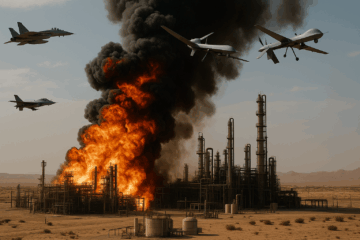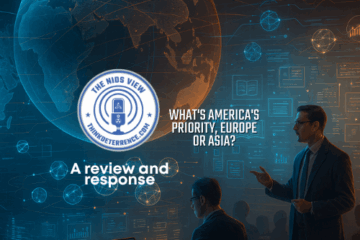The commander of the US Strategic Command, General Anthony Cotton, correctly warns that the United States may not be able to deter Chinese aggression using the same economic leavers employed during the Cold War by Ronald Reagan and George H. W. Bush. Margaret Thatcher’s claim that “Reagan won the Cold War without having to fire a shot,” was prescient and largely due to the economic approach President Reagan initiated. General Cotton’s warning suggests that Reagan’s good fortune will not necessarily carry over to the challenge posed by China.
Two issues are at play today. First, a direct military confrontation between the United States and China appears inevitable, despite the economic entanglement that was intended to prevent it. Second, two nations that are so closely tied economically have rarely waged war, leaving such conflict’s second and third order effects unknown. Should the United States follow Reagan’s approach and challenge China’s economic rise, there may be a path to avoiding conflict. Oil may be a good place to begin such an effort because China is so highly dependent on oil imports.
President Reagan began by initiating a change in US oil price policy that commenced what National Security Council official Roger Robinson called a policy of “economic warfare” against the Soviet Union. One of Reagan’s first moves was to decontrol the price of oil. This lowered the price of oil and markedly decreased the earnings of the Soviet government, which relied heavily on oil and gas sales to generate foreign currency reserves.
A second move was to encourage the expansion of American oil and gas production over the long-term—driving down prices. In 1984, President Reagan persuaded the Kingdom of Saudi Arabia to markedly increase oil production by seven million barrels a day, again seriously reducing Moscow’s export earnings. As an importer of oil, driving prices down would help, not hurt, the Chinese economy. Thus, the United States would need to put Chinese oil imports at risk and more expensive.
China is growing its ability to project military power astride key maritime choke points which see the transit of 60 percent of global oil production—58.9 million barrels of oil per day. This includes four choke points where China is seeking a military presence. These include: the Straits of Hormuz (with the help of Iran); the Straits of Malacca (through military construction in the South China Sea); Bab el-Mandeb (with Iranian/Houthi help); and the Suez Canal.
While China fears an oil cut-off during a military conflict, it appears China is seeking to turn the tables on the United States. As part of China’s belt and roads initiative, overland routes for petroleum export are under construction, with a specific design to prevent American interference.
Given the stakes, the United States must act with urgency and circumspection as it looks for ways to economically disentangle from China—a country which clearly seeks to supplant American global influence. As the Chairman of the Committee on the Present Danger warned in a recent “Xi’s Pearl Harbor” broadcast, many American institutions may not be up to the challenge. Employing oil as a deterrent force is no simple task.
If China were to achieve a stranglehold on oil tanker transportation, America’s NATO allies stand to suffer most. Michael Klein and Robert Zubrin point out that it is no coincidence that each recession since 1975 began with sharp spikes in oil prices.
Currently, the United States is the largest oil producer in the world despite the Biden administration’s efforts to constrain oil production. Should administration’s change or President Biden change his position on hydrocarbons, the United States could, in a time of crisis, ramp up production to counter Chinese efforts to constrain oil flows.
There is real value in the United States securing the sea-lanes and thwarting Chinese plans to build overseas bases at key the key geographic points mentioned above. One of China’s weaknesses is that it uses economics in a purely coercive way that seem attractive at first, but always carry heavy burden on the back end. States participating in the Belt and Road Initiative are now coming to regret their decision. Buyer’s regret is a key tool the United States can use to thwart Chinese expansionist efforts.
Maintaining a sufficiently sized and capable US Navy that can patrol sea lanes remains a core capability and coercive tool of American diplomacy. The sight of American warships in foreign ports, rather than Chinese warships, speaks volumes to those countries considering which superpower to support. This is proving particularly true in the Middle East as oil rich nations are reconsidering their cooperation with the United States.
In a future strategic environment where China attempts to use oil as a coercive tool, the United States must be prepared to push back or prevent such a set of circumstances from ever materializing. The time is now for American policymakers to contemplate the role oil can play in economic warfare with China. Xi Jinping is certainly thinking about it.
Peter Huessy is a senior fellow at the National Institute for Deterrence Studies. Views expressed in this article are the author’s own.
About the Author

Peter Huessy
Mr. Peter Huessy is President of his own defense consulting firm, Geostrategic Analysis, founded in 1981, and through 2021, Director of Strategic Deterrent Studies at the Mitchell Institute on Aerospace Studies. He was the senior defense consultant at the National Defense University Foundation for 22 years. He was the National Security Fellow at the AFPC, and Senior Defense Consultant at the Air Force Association from 2011-2016.
Mr. Huessy has served as an expert defense and national security analyst for over 50 years, helping his clients cover congressional activities, arms control group efforts, nuclear armed states actions, and US administration nuclear related policy, budgets, and strategies, while monitoring budget and policy developments on nuclear deterrence, ICBM modernization, nuclear arms control, and overall nuclear modernization.
He has also covered nuclear terrorism, counterterrorism, immigration, state-sponsored terrorism, missile defense, weapons of mass destruction, especially US-Israeli joint defense efforts, nuclear deterrence, arms control, proliferation, as well as tactical and strategic air, airlift, space and nuclear matters and such state and non-state actors as North Korea, China, Iran, Syria, Venezuela and Hezbollah, Hamas, and Al Qaeda. This also includes monitoring activities of think tanks, non-governmental organizations, and other US government departments, as well as projecting future actions of Congress in this area. His specialty is developing and implementing public policy campaigns to secure support for important national security objectives. And analyzing nuclear related technology and its impact on public policy, a study of which he prepared for the Aerospace Corporation in 2019.





Quick PS to my earlier comment: As Peter also rightly implies, maximal American energy independence is critical both for deterrence of and defense during the above mentioned China war scenario. So, we need a maximal capacity for oil and gas extraction, refining, and distribution both domestically and to overseas Allies.
Anonther great & compelling Peter Huessy analysis. Makes vital points about American strategy to deter/contain China and prevail in any shooting war that might occur over Taiwan or elsewhere. Article expands on relevant lessons from Cold War I history of our containing and beating USSR, then clearly and concisely extends into current Cold War II. This essential thought-piece raises a concerning scenario: Given Europe’s dependence on petroleum & gas from overseas and from Russia, and lack of a secure (or any) EU land route to Middle East’s and US’s oil fields, China could use the expanding PLA navy’s far-ranging nuclear subs to force European NATO to stay out of the fight in a shooting war between US and China. What does this say about US self-sufficiency in deterrence and force projection? About our need for a greatly strengthened blue water global-reach surface and undersea Navy? About the future of NATO solidarity? Maybe Peter will shed light in a future article?